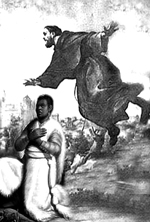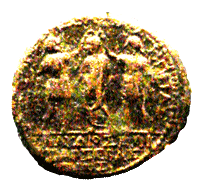Caesarea in 'Acts of the Apostles'
Miracles of Time and Space
Caesarea Maritima was capital of Judaea during “the time of Jesus” (and for several centuries thereafter) but the Gospels never once mention the city.
In the Jesus tale, at no point does the perambulating messiah even come close to the vibrant port – and surely his message was for the Gentiles as well as the Jews? Even more puzzling is the fact that none of the New Testament epistles – supposedly the correspondence of the nascent Church – makes a single allusion to “Caesarea-on-Sea” either.
This lack of reference to the metropolis is in stark contrast to the Acts of the Apostles which refers to the city no fewer than seventeen times, setting many key events in Caesarea. These include Peter’s baptism of the first Gentile, a Roman centurion (as if); and the proselytizing of Philip the evangelist, soon after he “vanishes” from Gaza and reappears twenty five miles away in Azotus (Ashdod), courtesy of the Holy Spirit (Acts 8.39).
But it is the apostle Paul in particular who frequents the great port most often, embarking on or arriving back from missionary journeys at Caesarea, and even, it seems, serving a two-year jail term in the city as a prelude to his journey to Rome.
To all intents, the author of Acts adopted Caesarea as the primary stage for his “story of the Church” and it is not difficult to work out why. On the one hand, Caesarea symbolized “alien conquest of Judaea” – Rome with its Hellenistic culture imposing its will on the Promised Land. On the other hand, Caesarea symbolized “Christian conquest of the alien intruder,” winning for Christ the world conqueror.
In the Christian dreamscape the new faith radiates out from the port city – as a Gentile faith for a Gentile empire.
“And when they came up out of the water, the Spirit of the Lord carried Philip away, and the eunuch saw him no more, and went on his way rejoicing. But Philip found himself at Azotus, and as he passed through he preached the gospel to all the towns until he came to Caesarea.“
– Acts 8.39-40.
In fact, Acts itself, in chapter 10, exposes the emptiness of “Philip the evangelist in Caesarea”. When Cornelius is mindful to contact a representative of the Church, Philip doesn’t get a mention! Cornelius sends for the man from out of town, the apostle Peter!
“At Caesarea there was a man named Cornelius, a centurion of what was known as the Italian Cohort, a devout man who feared God with all his household, gave alms liberally to the people, and prayed constantly to God.” – Acts 10.1-3.
In Caesarea Peter neither cures sickness nor exorcises demons. Rather, he performs a theologically important miracle of evangelical conversion. Surprisingly, the text reports that the “apostle to the circumcision” performs the first baptism of an uncircumcised Gentile – but then it is all part of the aggrandizement of Peter that suited the Church in Rome.
“About the ninth hour of the day he saw clearly in a vision an angel of God coming in and saying to him, “Cornelius.” And he stared at him in terror, and said, “What is it, Lord?” And he said to him, “Your prayers and your alms have ascended as a memorial before God. And now send men to Joppa, and bring one Simon who is called Peter; he is lodging with Simon, a tanner, whose house is by the seaside.” – Acts 10.3-6.
“Then hath God also to the Gentiles granted repentance unto life.”– Acts 11.18.
“About the ninth hour of the day he saw clearly in a vision an angel of God coming in and saying to him, “Cornelius.” And he stared at him in terror, and said, “What is it, Lord?” And he said to him, “Your prayers and your alms have ascended as a memorial before God. And now send men to Joppa, and bring one Simon who is called Peter; he is lodging with Simon, a tanner, whose house is by the seaside.” – Acts 10.3-6.
“Then hath God also to the Gentiles granted repentance unto life.”– Acts 11.18.
With the Petrine intrusion over, the yarn returns to the “scattered brethren” and moves the story onto Antioch – where it leaves behind the Jews and becomes the story of a “Gentile” church.
Josephus mentions first Theudas and then Judas, in reverse chronological order – and it is precisely that reverse order which is put into the mouth of Gamaliel at the trial of Peter and the apostles in Acts 5.34-39 – except that Gamaliel does not realize that the order is reversed (“Theudas …was slain … After this man rose up Judas …”). Nor does the writer himself notice the other anachronism: Theudas won’t lose his head for another ten years!
“At that time some prophets came down from Jerusalem to Antioch, and one of them named Agabus stood up and predicted by the Spirit that there would be a severe famine all over the world, and it happened under Claudius.”
– Acts 11.27-28.
“About this time,” continues the Christian novelist, Herod the king [Agrippa I] “stretched forth his hands to vex certain of the church and killed James the brother of John with the sword” (Acts 12.1).
We have now slipped back in time, for Agrippa is still alive in the first part of Acts 12. But if Agrippa is still king in Judaea the region is NOT ruled by a Roman procurator and troops of the Italian cohort are not stationed in Caesarea!
But if the baptism and fellowship of Cornelius has long since occurred and God himself had been glorified in Jerusalem for the new dispensation to the Gentiles (Acts 11.18) why do “certain Pharisees which believed” try to “yoke” the non-Jews? Why is circumcision back on the agenda – does Peter’s authority count for nothing? Or did the prince of the apostles never really go to Caesarea?
“Herodias took upon her to confound the laws of our country and divorce herself from her husband while he was alive and was married to Herod [Antipas], her husband’s brother by the father’s side.” – Antiquities 18.5.4.
“For Herod himself had given orders to have John arrested, and he had him bound and put in prison. He did this because of Herodias, his brother Philip’s wife, whom he had married. For John had been saying to Herod, ‘It is not lawful for you to have your brother’s wife.’ So Herodias nursed a grudge against John and wanted to kill him.” – Mark 6.17-19.
Oh well, religious fantasy doesn’t need any particular time frame – it exists in the mind of those who believe, unrestrained by any mere earth-bound chronology!
Far from regarding Agrippa as a villain, Josephus reported that “Agrippa’s temper was mild, and equally liberal to all men. He was humane to foreigners, and made them sensible of his liberality.” (Antiquities, 19,7.3). He has to be made into a bad guy by the Christian story tellers – they needed a new “persecutor” now that Paul had become one of the good guys!
“He put on a garment made wholly of silver, and of a texture truly wonderful … being illuminated by the fresh reflection of the sun’s rays upon it, shone out after a surprising manner … Presently his flatterers cried out, one from one place, and another from another … that he was a god; and they added… “we henceforth own thee as superior to mortal nature.” Upon this the king did neither rebuke them, nor reject their impious flattery. But as he presently afterward looked up, he saw an owl sitting on a certain rope over his head, and immediately understood that this bird was the messenger of ill tidings, as it had once been the messenger of good tidings to him; and fell into the deepest sorrow. A severe pain also arose in his belly, and began in a most violent manner. He therefore looked upon his friends, and said, “… I, who was by you called immortal, am immediately to be hurried away by death. …And when he had been quite worn out by the pain in his belly for five days, he departed this life … his generosity was boundless.”
“Then he [Herod agrippa] went down from Judea to Caesarea and spent time there …On an appointed day Herod put on his royal robes*, took his seat upon the throne, and delivered an oration to them. And the people were shouting, “The voice of a god, and not of a man!”. Immediately an angel of the Lord struck him down, because he did not give God the glory, and he was eaten by worms and breathed his last.”
* Why would the author of Acts mention the donning of the robe at all, if he was not consciously following the story in Josephus?
” ‘The king did not rebuke them, nor did he reject their impious flattery. But after a little, looking up, he saw an angel sitting above his head. And this he quickly perceived would be the cause of evil as it had once been the cause of good fortune, and he was smitten with a heart-piercing pain.’ …
I marvel greatly that Josephus so fully agrees with the divine scriptures.” Church History, 2.10.6,10.
You bet he does!
- Josephus, Jewish Antiquities; Jewish War (Hendrickson 2006)
- Avner Raban, Kenneth Holum, Caesarea Maritima – A Retrospective after Two Millennia (Brill, 1995)
- Eusebius, The Martyrs of Palestine (Digireads, 2005); History of the Church (Digireads, 2005)
- Bo Reicke, The New Testament Era (Adam & Charles Black, 1968)
- Ehud Netzer, The Architecture of Herod, the Great Builder (Baker, 2008)
- Arther Ferrill, Caligula, Emperor of Rome (Thames & Hudson, 1991)
- M. Grant, Herod the Great (McGraw-Hill, 1971)
- Jerome Murphy-O’Connor, The Holy Land (OUP, 1986)



But Syria is not Caesarea and 69 is not 39 (or even 41-44).
Three years later Agrippa was dead.
